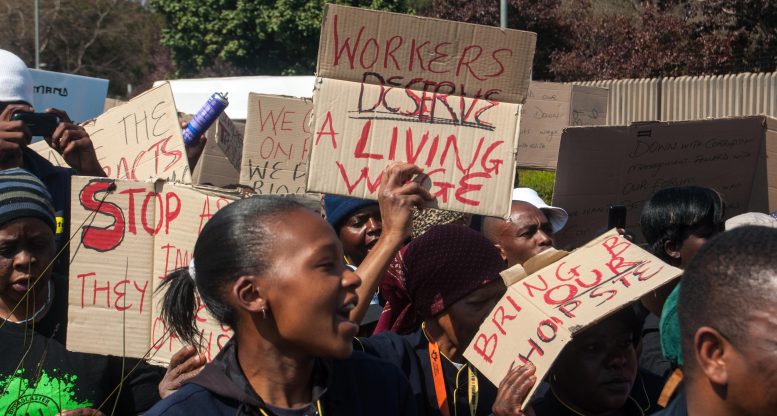
University of Johannesburg cleaners and other organizations supporting the Persistent Solidarity Forum march in demand of a fair living wage for the workers. Credit: Meraj Chhaya (CC BY 2.0 Deed)
A new report from Binghamton University underscores the global neglect of worker rights, ranking countries on their human rights observances and identifying a decline in the protection of labor rights despite economic globalization favoring corporate over worker interests.
Worker rights are among the least protected human rights in the world, according to new research from faculty at Binghamton University, State University of New York.
The findings are part of a new report published by the CIRIGHTS Data Project, the largest human rights dataset in the world. Since 1981, the project has ranked countries around the world on their respect for human rights, providing an annual “report card” on 25 internationally recognized human rights. The project is co-led by Binghamton University Professor of Political Science David Cingranelli.
According to their latest report, published in Human Rights Quarterly, the five countries with the best overall scores were Canada, Sweden, New Zealand, Norway, and Portugal. The five countries with the lowest overall scores were Iran, Syria, North Korea, China, and Iraq.
Worker rights, including the right to form a trade union and the right to bargain collectively – are among the least protected human rights. Worker rights are “always violated to some extent,” wrote the researchers.
“Previous research shows that it is unlikely that governments protect the rights to an adequate minimum wage, occupational health, and safety, or reasonable limitations on work hours (including voluntary overtime work) unless they allow workers to form independent trade unions and to bargain collectively,” said Cingranelli. “In other words, the right to unionize, bargain, and strike are the gateway rights. If they are protected, all other labor rights are likely to be protected as well. But globally, the gateway rights are in decline.”
Cignarelli said that while democratic and rich countries protect labor rights more than others do, economic inequality has increased almost everywhere.
“Economic globalization has increased competition among nations, which has led governments to favor corporations over workers in conflicts between the two,” said Cignarelli.
In the least economically developed countries, large agricultural, mining, and oil extraction companies have their way with workers, said Cignarelli. This also happened during the early stage of industrialization in the United States.
“It is important to remember that companies and workers typically take adversarial positions about how much attention corporate leaders should pay to what workers want concerning the terms and conditions of their work,” he said. “Corporate leaders typically prefer to distribute most of the profit from their activities to shareholders, not workers.”
Stringent labor regulations in one country can cause companies to change their locations. Cignarelli noted that it’s the role of government to make sure that workers have a fair chance to have their concerns heard.
“Without government policies protecting workers, companies can do whatever they want to keep unions out,” Cignarelli said.
Reference: Reference: “CIRIGHTS: Quantifying Respect for All Human Rights” by Skip Mark, Mikhail Filippov & David Cingranelli, 10 May 2024, Human Rights Quarterly.









“Corporate leaders typically prefer to distribute most of the profit from their activities to shareholders, not workers”. That says it all. If a company doesn’t keep increasing its profit, Wall Street’s unquenchable greed will demand that heads go to the chopping block.